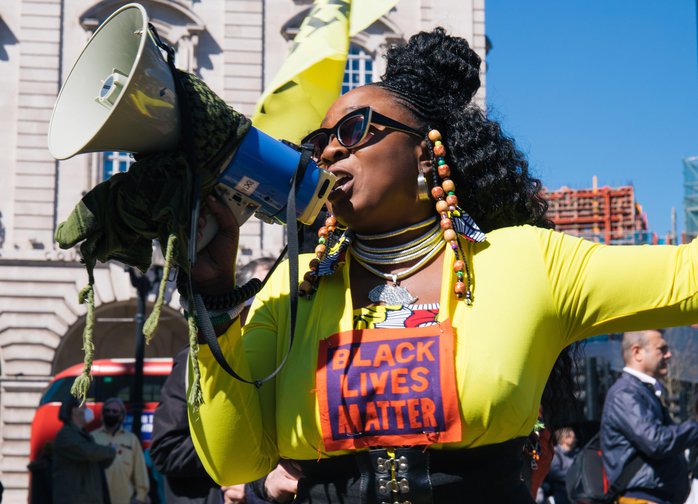The briefings continued to classify protests against the PCSC Bill as “anti-fascist” and said the bill contains provisions to “illegalise” protest activity. They did not explain why these protests did not fall into the “social justice” category.
Experts said these inconsistent or ambiguous classifications reflect a willingness to justify differing levels of proactive police action toward different protesters.
Emily Apple from police monitoring group Netpol told openDemocracy: “It is damning that the police immediately assume movements seeking social justice are a public order threat requiring risk assessments and surveillance.
“We know briefings prepared by the police are often subjective and often wildly inaccurate in terms of the threat they perceive from individuals and groups. For example, intelligence documents seen previously by Netpol fabricate the threat of violence posed by protesters to justify repressive police operations.”
Environmental protests ‘high priority’
The three assessments consistently class environmental protests as “high priority” and make recommendations for addressing or reducing their potential disruption.
The spring 2021 assessment says, “all forces to intervene at events at an early stage to prevent increase of numbers”, while the autumn 2021 document warns that these activists are engaged in activity of “increasing complexity, intended to cause maximum disruption and public attention for their agenda”.
The briefings also warn about increased activity from student activist groups and recommend that in response forces enhance their “open source” monitoring capability, suggesting an increase in social media surveillance of young activists.
They acknowledge that climate crisis demonstrators are not violent, stating: “Any violence that is seen is almost always exclusively against environmental protesters.”
The PCSC Bill became law in May. It allows police officers to place restrictions on protests they believe will cause “serious disruption” – including if they get too “noisy”. However, it’s not the only new legislation targeting the right to protest.
Experts have warned that the Public Order Bill, currently going through the House of Commons, contains further measures to restrict protest activity and increase police powers – and specifically targets the actions of Extinction Rebellion and other climate protesters.
The bill introduces new criminal offences for ‘locking-on’ and disrupting major transport infrastructure, such as HS2. Both these offences appeared in the original PCSC Bill, but were thrown out by the House of Lords.
Jun Pang, policy and campaigns officer at Liberty, said: “It’s clear that this government is trying to shut down our right to protest, criminalising protesters and handing the police ever more powers to surveil and target them. The scale of police monitoring revealed in these documents is horrifying, but the government is trying to go further.”
Pang said the new bill “includes protest banning orders, which could ban individuals – including those who haven’t committed a crime – from engaging in protest, subject them to constant GPS monitoring, and bar them from participating in public life. These measures are an attack on communities, aiming to cut people off from the relationships that make protest movements strong.”
A NPCC spokesperson said: “Policing strives to ensure decision making is consistent and fair, and is accountable to the law. Ultimately, however, each event or protest has to be assessed on its own unique circumstances. That assessment does not include the cause or issue for the protest – all groups or causes are treated impartially.
“The guiding principles of policing protests are the safety of protesters, the public and police officers involved, preventing criminal behaviour or disorder and de-escalating tensions. Police officers also seek to find the right balance between the rights of protesters and those of local residents and businesses, and will work to minimise serious disruption to communities and protect critical infrastructure.”


Comments
We encourage anyone to comment, please consult the oD commenting guidelines if you have any questions.